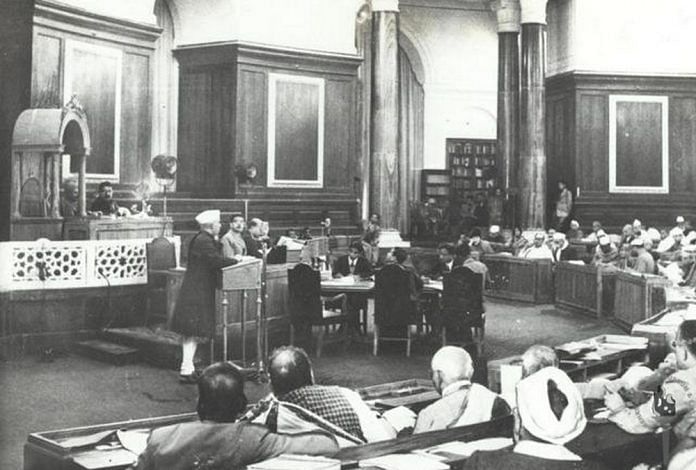Despite being a vocal advocate of minority rights, Seth was against reservation for ‘backward classes’.
Damodar Swarup Seth, a Constituent Assembly member from United Provinces (now Uttar Pradesh), was a staunch socialist who once said that the assembly should be dissolved as it didn’t represent all sections of the Indian society. He suggested that a new one be established on the basis of universal adult franchise.
Seth was an outspoken defender of the rights of people from the economically and socially lower strata of the society but opposed the idea of reservation as the solution to uplift them.
Early life and political career
Born in Bareilly in February 1896, Seth received his primary education from Government High School, Bareilly, and A.P. Mission High School, Allahabad (now Prayagraj). He completed his education from Reid Christian College, Lucknow.
Seth was among the 40 people arrested in connection with the 1925 Kakori Conspiracy Case, a train-robbery incident that led the government of British India to put to trial several suspects. Seth was arrested for interrogation but was freed on medical grounds.
During the Indian freedom struggle, he was also arrested on several other occasions for participation in Congress movements.
Seth was a member of several political organisations, including the All India Congress Committee and the UP Satyagraha Council. He went on to take on a number of leadership roles — secretary of Congress Socialist Party in 1935, president of UP Congress Committee in 1946, among others. He was also a national executive member of the Socialist Party of India.
Also read: Upendranath Barman, the voice in Constituent Assembly for uplift of backward classes
Constituent Assembly motions
On 5 November 1948, during a Constituent Assembly meeting finalising the Draft Constitution, Seth moved an amendment where he suggested that an altogether new Constituent Assembly be elected. He said the immediate body was not directly elected by the people of this country. In this regard, he also recommended that the consideration to frame the Draft Constitution be postponed.
Seth said, “I can emphatically say that this House cannot claim to represent the whole country. At the most it can claim to represent that 15 per cent of the population of India who had elected the members to the provincial legislatures. The election too, by virtue of which the members of this House are here, was not a direct one, they are here by virtue of an indirect election… will be in my opinion a very great mistake to say that this House is competent to frame a Constitution for the whole country.”
His motion, however, was not adopted by the assembly.
Seth also suggested an amendment to Article 30 under Fundamental Rights, laying emphasis on the fact that India must enforce a “socialist democratic order”.
Mocking the “capitalistic order”, he said that the society should be “made clear of the exploiter class, and that can only be possible when we establish a socialist democratic order, and transfer to public ownership the ‘important means of production, communication, credit and exchange, mineral resources and the resources of natural power and such other large economic enterprise as are matured for socialisation’; bring about the ‘municipalisation of public utilities’; and ‘the encouragement of the organisation of agriculture, credit and industries on co-operative basis’”.
The assembly didn’t accept this motion either.
Also read: Balkrishna Sharma: A freedom fighter & poet admired by Atal Bihari Vajpayee
Reservation and minorities
Although a vocal advocate of the rights of minorities in India, Seth was against the idea of reservation for “backward classes”. The very term was problematic for him as he said that there could be no easy way to define it. He feared that reservation in services for backward classes would lead to casteism and favouritism and threaten the secular fabric of this country. For him, merit and qualification were the best determinants of the suitability of a candidate.
At another sitting, Seth proposed a new article under Article 22 where it could be enforced that “the use of religious institutions for political purposes and the existence of political organisation on religious basis is forbidden”.
His motion wasn’t accepted by the assembly as B.R. Ambedkar pointed out that this idea had already been included in Article 19.
Seth also opposed the idea of recognising minorities based on the lines of religion and community and instead moved an amendment under Article 23 recommending that minorities be recognised only on the basis of language.
He said, “I feel, Sir, that in a secular state minorities based on religion or community should not be recognised. If they are given recognition then I submit that we cannot claim that ours is a secular state.”
The socialist leader also proposed an amendment to Article 13 under Fundamental Rights, in which he admitted that freedom of speech and expression were guaranteed but offered that a separate segment for the freedom of the press be added.
He believed, “The present is the age of the press and the press is getting more and more powerful today. It seems desirable and proper, therefore, that the freedom of the press should be mentioned separately and explicitly.”
Unfortunately, there’s not enough information about Seth’s last few days. He died in 1965.



